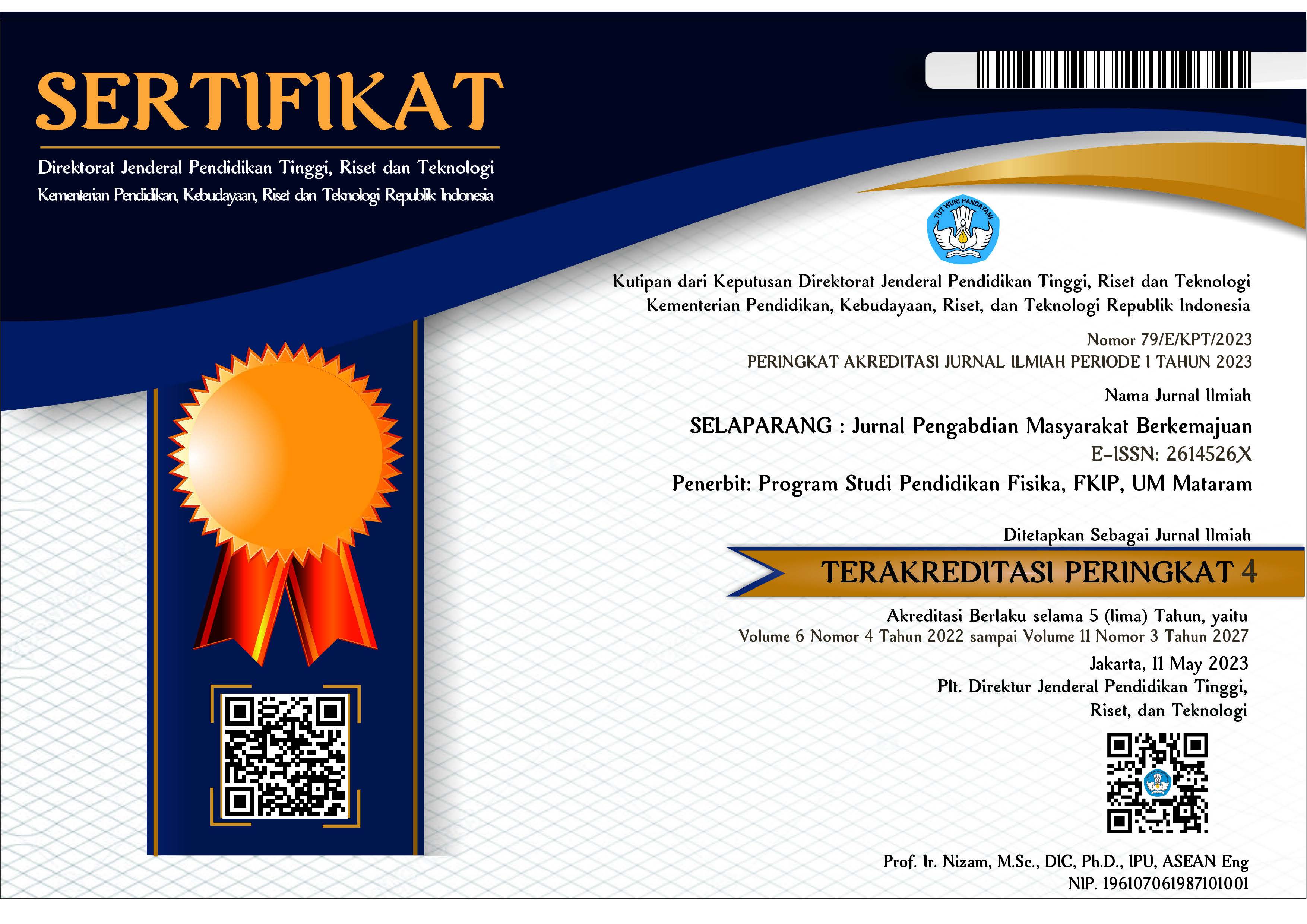Pemberdayaan masyarakat lokal dalam pengelolaan sampah di ITDC Mandalika untuk keberlanjutan ekosistem pariwisata
Abstract
Abstrak
Kawasan Ekonomi Khusus (KEK) Mandalika yang dikelola oleh Indonesia Tourism Development Corporation (ITDC) merupakan salah satu destinasi wisata unggulan di Indonesia. Namun, peningkatan jumlah wisatawan di kawasan ini juga menimbulkan permasalahan lingkungan, terutama dalam pengelolaan sampah. Pengabdian ini bertujuan untuk menganalisis peran ITDC dalam pengelolaan sampah di kawasan Mandalika serta mengevaluasi tantangan dan peluang dalam mewujudkan sistem pengelolaan sampah yang berkelanjutan. Metode yang digunakan melalui wawancara dengan pihak ITDC untuk memperoleh data mengenai kebijakan, implementasi, serta kendala dalam pengelolaan sampah di kawasan tersebut. Hasil kegiatan menunjukkan bahwa meskipun ITDC telah menerapkan berbagai kebijakan dan program dalam pengelolaan sampah, masih terdapat tantangan dalam hal infrastruktur, kesadaran masyarakat, serta koordinasi dengan pihak terkait. Untuk mengatasi permasalahan ini, diperlukan strategi yang melibatkan edukasi dan pemberdayaan masyarakat, peningkatan infrastruktur pengelolaan sampah, penerapan konsep ekonomi sirkular, serta kolaborasi dengan berbagai pihak. Dengan implementasi yang tepat, diharapkan kawasan Mandalika dapat menjadi destinasi wisata yang bersih, nyaman, dan berkelanjutan.
Kata kunci: ekonomi sirkular; ITDC Mandalika; pariwisata berkelanjutan; pemberdayaan masyarakat; pengelolaan sampah
Abstract
The Mandalika Special Economic Zone (SEZ), managed by the Indonesia Tourism Development Corporation (ITDC), is one of Indonesia's premier tourist destinations. However, the increasing number of tourists in this area has also led to environmental issues, particularly in waste management. This initiative aims to analyze ITDC's role in waste management within the Mandalika area and evaluate the challenges and opportunities in establishing a sustainable waste management system. The method used involves conducting interviews with ITDC representatives to gather data on policies, implementation, and obstacles related to waste management in the area. The results indicate that although ITDC has implemented various policies and programs for waste management, challenges persist in terms of infrastructure, public awareness, and coordination with relevant stakeholders. To address these issues, strategies such as community education and empowerment, enhancement of waste management infrastructure, the application of circular economy principles, and collaboration with multiple stakeholders are necessary. With proper implementation, the Mandalika area is expected to become a clean, comfortable, and sustainable tourist destination.
Keywords: circular economy; community empowerment; ITDC Mandalika; sustainable tourism; waste management.
Keywords
Full Text:
PDFReferences
Adha, L. H. (2021). Pengaturan Penggunaan Tenaga Kerja Asing (Tka)Di Kawasan Ekonomi Khusus Mandalika. Jurnal Private Law …, 1(2). http://journal.unram.ac.id/index.php/privatelaw/article/view/272%0Ahttps://journal.unram.ac.id/index.php/privatelaw/article/download/272/117
Ali, M., Juaini, M., Pahrudin, P., Nadia, S., Salmiah, S., & Fatihi, T. (2024). Innovation and Creativity of Stakeholders Toward Sustainable Tourism Development in the Time of Crisis: A Case of Special Economic Zone, Indonesia. International Journal of Sustainable Development and Planning, 19(12), 4573–4583. https://doi.org/10.18280/ijsdp.191206
Baloch, Q. B., Shah, S. N., Iqbal, N., Sheeraz, M., Asadullah, M., Mahar, S., & Khan, A. U. (2023). Impact of tourism development upon environmental sustainability: a suggested framework for sustainable ecotourism. Environmental Science and Pollution Research, 30(3), 5917–5930. https://doi.org/10.1007/s11356-022-22496-w
Brotosusilo, A., Utari, D., Negoro, H. A., Firdaus, A., & Velentina, R. A. (2022). Community empowerment of waste management in the urban environment:More attention on waste issues through formal and informal educations. Global Journal of Environmental Science and Management, 8(2), 209–224. https://doi.org/10.22034/GJESM.2022.02.05
Budi, S., Yuli, C., Azizurrohman, M., & Pramuja, R. A. (2025). Tourism-driven development : evaluating the benefits of the Mandalika Special Economic Zone Tourism-driven development : evaluating the benefits of the. Cogent Social Sciences, 11(1). https://doi.org/10.1080/23311886.2025.2460317
Fatmawati, F., Ilham, I., Saleh, S., & Razak, A. R. (2024). Waste Management System: A Case Study of Waste Bank Management Toward a Circular Economy in Maros Regency. Jurnal Borneo Administrator, 20(1), 1–14. https://doi.org/10.24258/jba.v20i1.1206
Huong, D. T. T., Ha, N. T. T., Do Khanh, G., Van Thanh, N., & Hens, L. (2022). Sustainability assessment of coastal ecosystems: DPSIR analysis for beaches at the Northeast Coast of Vietnam. Environment, Development and Sustainability, 24(4), 5032–5051. https://doi.org/10.1007/s10668-021-01648-x
Kong, T., Li, X., Pan, K., Zhang, W., & Li, R. (2023). Changes in Sources and Composition of Beach Waste in Coastal Cities around the Bohai Sea of China during the Tourist Peak and Off-Peak Seasons. International Journal of Environmental Research and Public Health, 20(3). https://doi.org/10.3390/ijerph20032573
Markley, L. A., & Olivelli, A. (2022). Plastic Pollution , Waste Management Issues , and Circular Economy Opportunities in Rural Communities.
Phelan, A., Ruhanen, L., & Mair, J. (2020). Ecosystem services approach for community-based ecotourism: towards an equitable and sustainable blue economy. Journal of Sustainable Tourism, 28(10), 1665–1685. https://doi.org/10.1080/09669582.2020.1747475
Thushari, G. G. N., & Senevirathna, J. D. M. (2020). Plastic pollution in the marine environment. Heliyon, 6(8), e04709. https://doi.org/10.1016/j.heliyon.2020.e04709
Wahid Ridlo Wicaksono Zain, A., & Muslim, A. (2024). Failure of Sustainable Waste Management In The Perspective of Community Empowerment in the Garbage Canister Program in Dusun Karang. Al-Hikmah: Jurnal Ilmu Dakwah Dan Pengembangan Masyarakat, 22(1), 11–24. https://alhikmah.uinkhas.ac.id/index.php/alhikmah/article/view/199
Yuli, S. B. C., Septiani, E., Pramuja, R. A., Supiandi, & Najmudin, M. (2023). Tourism Development and Local Community Welfare: A Case Study of the Mandalika Special Economic Zone. Journal of Environmental Management and Tourism, 14(4), 2097–2106. https://doi.org/10.14505/jemt.v14.4(68).21
DOI: https://doi.org/10.31764/jpmb.v9i2.29939
Refbacks
- There are currently no refbacks.

This work is licensed under a Creative Commons Attribution-ShareAlike 4.0 International License.
______________________________________________________
Jurnal Selaparang
p-ISSN 2614-5251 || e-ISSN 2614-526X
EDITORIAL OFFICE:



















